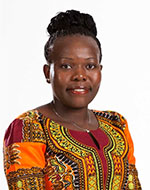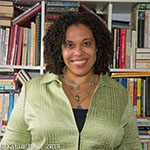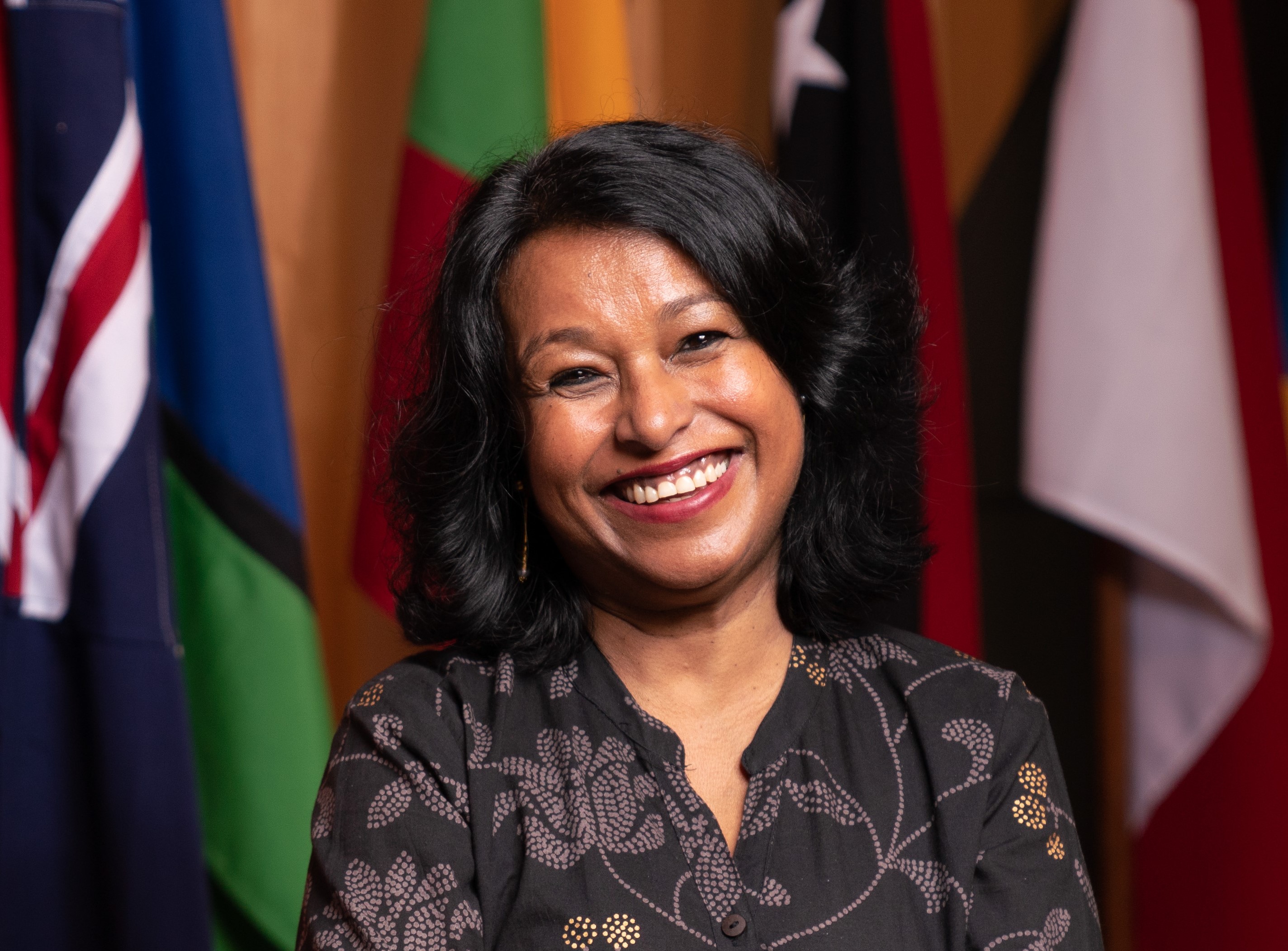Members
Working Group of Experts on People of African Descent
Current members
Barbara G Reynolds (Guyana), Chairperson
 Ms. Reynolds is the Vice-President for Administration, Advancement and Planning at the University of the Southern Caribbean in Trinidad and Tobago. She served as Deputy Vice-Chancellor at the University of Guyana from August 2014 to September 2019. Prior to this, Ms Reynolds was Head of Education for Save the Children UK, after having spent the previous two decades with UNICEF in programme, management and representational roles at Headquarters and country offices. Ms. Reynolds began her professional career as a teacher and continues to be involved in education. She Co-Chairs the CARICOM Digital Skills Task Force and is a Member of the Independent Technical Advisor Panel for the Global Partnership for Education. She is an active human rights professional, and an experienced human rights and gender mainstreaming facilitator. She holds a BA Education (Caribbean Union College), MA in Curriculum and Teaching (Howard University), the Post-Graduate Diploma in Distance Education (University of London) EdD in International Education Development/Curriculum and Instruction (Columbia University) and the MSt in International Human Rights Law (University of Oxford). Ms Reynolds’ second working language is Portuguese.
Ms. Reynolds is the Vice-President for Administration, Advancement and Planning at the University of the Southern Caribbean in Trinidad and Tobago. She served as Deputy Vice-Chancellor at the University of Guyana from August 2014 to September 2019. Prior to this, Ms Reynolds was Head of Education for Save the Children UK, after having spent the previous two decades with UNICEF in programme, management and representational roles at Headquarters and country offices. Ms. Reynolds began her professional career as a teacher and continues to be involved in education. She Co-Chairs the CARICOM Digital Skills Task Force and is a Member of the Independent Technical Advisor Panel for the Global Partnership for Education. She is an active human rights professional, and an experienced human rights and gender mainstreaming facilitator. She holds a BA Education (Caribbean Union College), MA in Curriculum and Teaching (Howard University), the Post-Graduate Diploma in Distance Education (University of London) EdD in International Education Development/Curriculum and Instruction (Columbia University) and the MSt in International Human Rights Law (University of Oxford). Ms Reynolds’ second working language is Portuguese.
Catherine S. Namakula (Uganda)

Ms. Namakula is a senior lecturer with the University of the Free State, Bloemfontein, South Africa and Professor in Human Rights and Criminal Justice with the Global Humanistic University, Curacao. She is a published scholar in public law and has served in various positions with expert bodies and organisations. She has made notable scholarly contributions relating to the inclusivity of people in criminal justice processes, promoting the parity of esteem of African languages and ensuring effective interpretative performance. She is also a legal advisor and community leader among immigrant entities and associations in South Africa. She holds a Doctor of Philosophy from the University of the Witwatersrand, Johannesburg, South Africa, and a Master's degree in Human Rights Law from the University of Nottingham, United Kingdom, among other qualifications.
Dominique Day, (United States of America)

Ms. Day is a human rights attorney and the executive director of DAYLIGHT | Rule of Law • Access to Justice • Advocacy. Internationally, her litigation, public policy, research, teaching, and capacity-building work over the past two decades has focused heavily on racial justice, non-discrimination, and human rights advocacy. She has extensive experience in criminal and civil litigation on behalf of individuals and communities within the Black diaspora, in addition to working on rule of law and access to justice issues in post-conflict and transitional States. She holds a bachelor’s degree from Harvard University and a juris doctor from Stanford Law School.
Bina D’Costa (Bangladesh)
 Ms. D’Costa is a Professor, Department of International Relations at the Coral Bell School, the Australian National University (ANU) and an Australian Research Council (ARC) Future Fellow. She has published six books and many essays, including Nationbuilding, Gender and War Crimes in South Asia (2011), Children and the Politics of Violence (2017) and Cascades of Violence (co-authored with John Braithwaite, 2018). She is a member of the International Chittagong Hill Tracts Commission, Bangladesh. As a Senior Migration and Displacement Specialist with UNICEF, she led its research program at the Office of Research. As a frontline researcher and humanitarian practitioner, she has contributed to Europe, East Africa and Horn of Africa refugee emergencies, and served in the first UN Rohingya Emergency Response Mission in Cox’s Bazar, Bangladesh. She has provided inputs and technical advice to witness protection and victim support mechanisms at the International Criminal Tribunal for Rwanda (ICTR), Office of the United Nations High Commissioner for Human Rights (OHCHR), International Crimes Tribunal, Bangladesh, and various civil society justice initiatives in Pakistan, Sri Lanka and Cambodia. Bina also led research on reparations for victims of sexual violence in Bangladesh with BLAST. She received the Distinguished Alumni Award, Kroc Institute, University of Notre Dame, United States in 2020 and the Ann Tickner Award from the International Studies Association (ISA) in 2022.
Ms. D’Costa is a Professor, Department of International Relations at the Coral Bell School, the Australian National University (ANU) and an Australian Research Council (ARC) Future Fellow. She has published six books and many essays, including Nationbuilding, Gender and War Crimes in South Asia (2011), Children and the Politics of Violence (2017) and Cascades of Violence (co-authored with John Braithwaite, 2018). She is a member of the International Chittagong Hill Tracts Commission, Bangladesh. As a Senior Migration and Displacement Specialist with UNICEF, she led its research program at the Office of Research. As a frontline researcher and humanitarian practitioner, she has contributed to Europe, East Africa and Horn of Africa refugee emergencies, and served in the first UN Rohingya Emergency Response Mission in Cox’s Bazar, Bangladesh. She has provided inputs and technical advice to witness protection and victim support mechanisms at the International Criminal Tribunal for Rwanda (ICTR), Office of the United Nations High Commissioner for Human Rights (OHCHR), International Crimes Tribunal, Bangladesh, and various civil society justice initiatives in Pakistan, Sri Lanka and Cambodia. Bina also led research on reparations for victims of sexual violence in Bangladesh with BLAST. She received the Distinguished Alumni Award, Kroc Institute, University of Notre Dame, United States in 2020 and the Ann Tickner Award from the International Studies Association (ISA) in 2022.
Miriam Ekiudoko (Hungary)
Ms. Ekiudoko is a human and civil rights activist and advocate. She is unapologetically passionate in the struggle for justice, dignity, rights and peace. Her varied background includes serving as a healer, storyteller, and international motivational and public speaker. She has taken on a variety of roles and tasks as a consultant, trainer, facilitator and artist. Her professional background covers the areas of racial justice and non-discrimination, working towards dismantling harmful and detrimental power structures, systems, and practices and replacing them with just ones. This entails developing and analyzing policies, strategies, recommendations, and educational materials; coordinating and evaluating projects; capacity building; and delivering workshops, lectures, and speeches. In the past two and a half decades she has founded and led a number of civil society organizations, movements, campaigns and cultural events, and has served as a board member and advisory counsellor at various African diaspora organizations and expert bodies. She has given lectures and facilitated workshops at several institutions, including governmental and international organizations, law enforcement academies, educational institutions, non-governmental organizations, and participated in panel discussions on human rights, discrimination, racial profiling, hate crimes; intersectionality, diversity, inclusion and belonging; the history and legacies of colonialism, imperialism, the enslavement, trafficking and illegal trading of Africans; racialization, and racial formation; reparations, racial justice, racial healing; agency and activism; sustainability, organizational development, community building, and self-empowerment.
View the list of all Special Procedure mandate-holders for a table of next appointments.